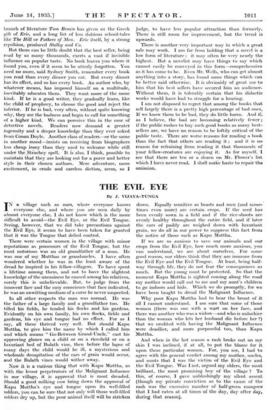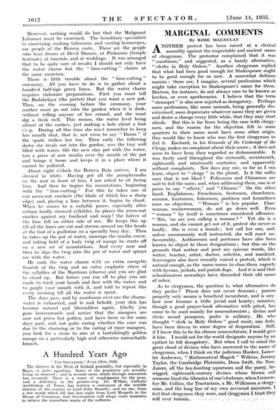THE EVIL EYE
By J. VIJAYA-TUNGA
IN a village such as ours, where everyone knows everyone, else, and where you are seen daily by almost everyone else, I do not know which is the more difficult to avoid—the Evil Eye, or the Evil Tongue. Seeing, however, that we did take precautions against the Evil Eye, it seems to have been taken for granted that it was the Tongue that defied control.
There were certain women in the village with minor reputations as possessors of the Evil Tongue, but the most notorious was an old grandfather of a man. He was one of my Mutthas or granduncles. I have often wondered whether he was in the least aware of the dread he inspired in his fellow-villagers. To have spent a lifetime among them, and not to have the slightest knowledge of the uneasiness he caused among his relatives, surely this is unbelievable. But, to judge from the innocent face and the easy conscience that face indicated, he was an unwitting medium of a curse he never suspected.
In all other respects the man was normal. He was the father of a large family and a grandfather too. He tilled his fields, he tended his flocks and his gardens. Evidently on his own family, his own flocks, fields and gardens, his eye and tongue had no effect. For as I say, all these thrived very well. But should Kapu Muttha, to give him the name by which I called him and which means " Go-Between Grand-Uncle," cast his approving glance on a child or on a rieeTfield or on a luxuriant bed of Bulath vine, then before the lapse of many days the child would be ill, a mysterious and wholesale decapitation of the ears of grain would occur, and the Bulath vines would wither away.
Now it is a curious thing that with Kapu Muttha, as with the lesser perpetrators of the Malignant Influence in our village, it is approval that is most dreaded. Should a good milking cow bring down the approval of Kapu Muttha's eye and tongue upon its well-filled udders, you can be sure that not only will those well-filled udders dry up, but the poor animal itself will be stricken down. Equally sensitive as beasts and men (and some- times even more) are certain crops. If the seed has been evenly sown in a field and if the rice-shoots are evenly healthy throughout the entire field, and if later the ears of paddy are weighed down with luxuriant grain, we do all in our power to suppress this fact from the notice of those such as Kapu Muttha.
If we are so anxious to save our , animals and our crops from the Evil Eye, how much more anxious, you can understand, we are about ourselves. For some good reason, our elders think that they are immune from the Evil Eye and the Evil Tongue. At least, being half- way through life, they do not fear the consequences so much. But the young must be protected. So that the moment Kapu Muttha is sighted coming along the road my mother would call out to me and my aunt's children to go indoors and hide. Which we do promptly, for we have been taught to dread the Malignant Influence.
Why poor Kapu Muttha had to bear the brunt of it all I cannot understand. I am sure that some of those women (there was one with a wart on her face, and there was another who was a widow—and who is unluckier than the woman who lets her husband die before her ?) that we credited with having the Malignant Influence were deadlier, and more purposeful too, than Kapu .Muttha.
And when in the hot season a rash broke out on my skin I was inclined, if at all, to put the blame for it upon these particular women. For, you see, I had to agree with the general verdict among my mother, uncles, and aunts that I was the victim of the Evil Eye and the Evil Tongue. Was I not, argued my elders, the most brilliant, the most promising boy of the village ? To this, of course, I gave unblushingly my silent assent (though my private conviction as to the cause of the rash was the excessive number of half-green mangoes that I had eaten at all times of the day, day after day, `dining that season). However, nothing would do but that the Malignant Influence must be exorcized. The hereditary specialists in exorcizing, making talismans, and casting horoscopes, are people of the Berava caste. These are the people who beat drums at Devil Dances, at Pinkamas (temple festivals), at funerals, and at weddings. It was arranged that to be quite sure of results I should not only have the water charm but the " lime-cutting " charm at the same exorcism.
There is little trouble about the " lime-cutting " ceremony. All you have to do is to gather about a hundred half-ripe green limes. But the water charm requires elaborate preparations. First you must tell the Badahelaya (the potter) that you want a new pot. Then, on the evening before the ceremony, your mother must go out into the garden when it is dark, without telling anyone of her errand, and she must dig a fresh well. This means, the water level being almost at the surface, just making a hole about a foot -ec T. During all this time she mu3t remember to keep her mouth shut, that is, not even to say " Damn " if the* spade strikes her toe. Then early the following dawn she steals out into the garden, sees the tiny well filled with water, fills the new clay pot with the water, ties a piece of new muslin over the mouth of the pot and brings it home and keeps it in a place where it cannot be polluted.
About eight o'clock the Berava Rala arrives. I am dressed in white. Having got all the paraphernalia on the mat in front of him, I am asked to sit facing him. And then he begins his incantations, beginning with the " lime-cutting." For this he takes one of our areca-nut crackers- (the blade of which has a sharp edge) and, placing a lime between it, begins to chant. When he, comes to a suitable pause, especially after certain loudly stressed syllables, he places the areca-nut cracker against my forehead and snap ! the halves of the lime fall on either side of me. He keeps this up till all the limes are cut and strewn around me like heads at the foot of a guillotine on a specially busy day. Then he takes up the pot of water, unwraps the muslin cover, and taking hold of a leafy twig of mango he starts off on a new set of incantations. And every ' now and then he dips the twig into the pot of water and sprays me with the water.
He ends the water charm with an extra energetic flourish of the twig and an extra emphatic stress of the syllables of the Mantram (charm) and you are glad to stand up. But before you run off to play you are made to wash your hands and face with the water, and to gargle your mouth with it, and told to repeat this every morning till all the water is spent.
The days pass, and by assiduous over-use the charm- water is exhausted, and lo and behold, your skin has become natural and blemishless again. Gladly you gaze heavenwards and notice that the niarigoes are now not green but golden, and have been so for some days past, and, not quite caring whether the cure was due to the charming or to the eating of riper mangoes, you look for a stone to aim at a tantalizingly golden mango on a particularly high and otherwise unreachable branch.



















































 Previous page
Previous page